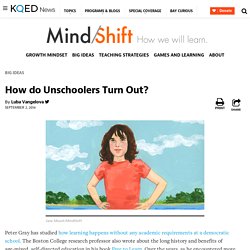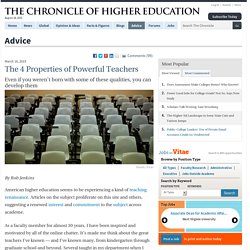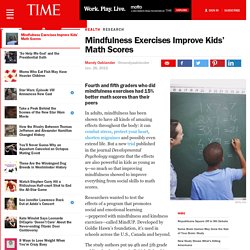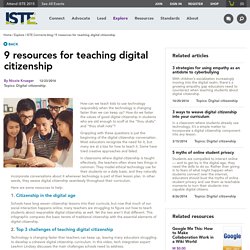

What If Everything You Knew About Disciplining Kids Was Wrong? Digital Natives, Yet Strangers to the Web. Tomorrow's Learning Today: 7 Shifts To Create A Classroom Of The Future. How do Unschoolers Turn Out? Peter Gray has studied how learning happens without any academic requirements at a democratic school.

The Boston College research professor also wrote about the long history and benefits of age-mixed, self-directed education in his book Free to Learn. Over the years, as he encountered more and more families who had adopted this approach at home (these so-called “unschoolers” are estimated to represent about 10 percent of the more than two million homeschooled children), he began to wonder about its outcomes in that setting. Finding no academic studies that adequately answered his question, he decided to conduct his own. In 2011, he and colleague Gina Riley surveyed 232 parents who unschool their children, which they defined as not following any curriculum, instead letting the children take charge of their own education. The Pros and Cons of Unschooling. When the Computer Takes Over for the Teacher.
Whenever a college student asks me, a veteran high-school English educator, about the prospects of becoming a public-school teacher, I never think it’s enough to say that the role is shifting from "content expert" to "curriculum facilitator.

" Instead, I describe what I think the public-school classroom will look like in 20 years, with a large, fantastic computer screen at the front, streaming one of the nation’s most engaging, informative lessons available on a particular topic. The "virtual class" will be introduced, guided, and curated by one of the country’s best teachers (a.k.a. a "super-teacher"), and it will include professionally produced footage of current events, relevant excerpts from powerful TedTalks, interactive games students can play against other students nationwide, and a formal assessment that the computer will immediately score and record. "So if you want to be a teacher," I tell the college student, "you better be a super-teacher. " A School That Ditches All the Rules, But Not the Rigor. The 4 Properties of Powerful Teachers - Advice. By Rob Jenkins American higher education seems to be experiencing a kind of teaching renaissance.

4 crazy ideas from Stanford about the future of college. In 2013, student groups at the design school at Stanford University started to tackle an interesting question: what will an undergraduate education at Stanford look like at the turn of the 22nd century?

They came up with four ideas, all of which look very different than the typical undergraduate experience today. Then they wrote and made videos framed as dispatches from the future, explaining what had happened in the past 86 years to make college look like this in the year 2100. This is a thought experiment, and just the idea that college will look different at all a century from now is provocative. The basic format of college — earning a degree in four years — is centuries old, and classroom lectures dates back to the 12 century.
Formative assessment - Google Slides. Kids Meditation: Mindfulness May Increase Children's Math Scores. In adults, mindfulness has been shown to have all kinds of amazing effects throughout the body: it can combat stress, protect your heart, shorten migraines and possibly even extend life.

But a new trial published in the journal Developmental Psychology suggests that the effects are also powerful in kids as young as 9—so much so that improving mindfulness showed to improve everything from social skills to math scores. Researchers wanted to test the effects of a program that promotes social and emotional learning—peppered with mindfulness and kindness exercises—called MindUP. Developed by Goldie Hawn’s foundation, it’s used in schools across the U.S., Canada and beyond. The study authors put 99 4th and 5th grade public school students in British Columbia into one of two groups.
One group received four months of the mindfulness program, and the other got four months of a standard “social responsibility” program already used in Canadian public schools. Despite Legalizing Gay Marriage These States Forbid Teaching About Gay Sex. This month the Supreme Court announced it would decide in the current term whether all 50 states must allow same-sex couples to marry.

No doubt the justices are aware of how public opinion on the issue has evolved. But while legal gay marriage has spread rapidly over the last several years (see this map), sex education laws in many states remain in the Dark Ages—even in states where gay marriage is allowed. The Student Loan Debt Crisis in 9 Charts. Update (6/29/2013): Congress didn't even come close to agreeing on new student loan rates, so interest rates doubled July 1 for students taking out one common federal loan.

After the July 4 recess and before most students take out new loans for college in August, Congress will have a window to fix the loan rate. Senate Democrats are now pushing for a temporary fix, a one-year extension of the low 3.4 percent interest rate that would give Congress time to hammer out a long-term solution. According to the Hill, they have scheduled a vote on the proposal for July 10, though others (including House Republicans and even some fellow Democrats in the Senate) may not be on board. Got student loans? You are far from alone: More than 38 million Americans have outstanding student loan debt totaling nearly $1 trillion, and those numbers are rising fast.
That's the big picture. 9 resources for teaching digital citizenship. How can we teach kids to use technology responsibly when the technology is changing faster than we can keep up?

How do we foster the values of good digital citizenship in students who are old enough to scoff at the “thou shalts” and “thou shalt nots”? Grappling with these questions is just the beginning of the digital citizenship conversation. Most educators recognize the need for it, but many are at a loss for how to teach it. Some have tried creative approaches and failed. In classrooms where digital citizenship is taught effectively, the teachers often share two things in common: They model ethical technology use for their students on a daily basis, and they naturally incorporate conversations about it whenever technology is part of their lesson plan. Why Google doesn’t care about hiring top college graduates - Quartz. On Dec. 4, Italians went to the polls to decide on a reform referendum that would redefine the power of local governments and reduce the power of the senate.

With a high turnout, my countryman rejected the reform. In the press, the voters’ decision was described as an Italian Brexit, and a triumph of populism. Beppe Grillo and his Five Star Movement, arguably Europe’s largest populist party, celebrated with Matteo Salvini, leader of the xenophobic Northern League; Marine Le Pen sent congratulations via Twitter, claiming that Italians’ had disavowed not just their prime minister, but the entire European Union.
What had actually happened, however, was more nuanced. And yet, the disappointment amongst liberals—the majority of whom had supported the reforms—was palpable. 17 right (and wrong) ways to use technology. 3 Ways to Teach Your Kids to Be Media Literate By Dr.

Robyn Silverman for KnowMore.tv Buy this! Lose weight! Build big muscles! To Advance Education, We Must First Reimagine Society. Why haven’t education reform efforts amounted to much? Because they start with the wrong problem, says John Abbott, director of the 21st Century Learning Initiative. Because disaffection with the education system reflects a much deeper societal malaise, it’s imperative that we first figure out what kind of world we really want: a world populated by responsible adults who thrive on interdependence and community, or a world of “customers” who feel dependent on products, services, and authority figures, and don’t take full responsibility for their actions? The answer, he says, will point to the changes needed in all three pillars of education — schools, families, and communities. As Abbott sees it, the need for reflection has never been greater. Spurred by technological advances, “civilization is on the cusp of a metamorphosis,” he says, that will lead either to societal collapse and chaos, or to a resurgence of liberty, community, and ethics.
Re-Imagining Society First, Education Second. Curiosity: It Helps Us Learn, But Why? : NPR Ed. RSA Animate - 21st century enlightenment. Why Girls Tend to Get Better Grades Than Boys Do. These days, the whole school experience seems to play right into most girls’ strengths—and most boys’ weaknesses. How Students Can Transform The Odyssey into an Alternate Reality Epic. Ivy League Schools Are Overrated. Send Your Kids Elsewhere. Four Skills to Teach Students In the First Five Days of School. 'Bloom'sDigitalTaxonomy' in The 21st Century. Dipsticks: Efficient Ways to Check for Understanding. What strategy can double student learning gains? According to 250 empirical studies, the answer is formative assessment, defined by Bill Younglove as "the frequent, interactive checking of student progress and understanding in order to identify learning needs and adjust teaching appropriately.
" Unlike summative assessment, which evaluates student learning according to a benchmark, formative assessment monitors student understanding so that kids are always aware of their academic strengths and learning gaps. Meanwhile, teachers can improve the effectiveness of their instruction, re-teaching if necessary.
The 10 Most Important Business Skills in 2020 (Infographic) In the near future, smart machines and systems will automate many jobs that exist today, changing the nature of skills that are in high demand. As social technologies play a more important role in value creation, skills such as social intelligence and new media literacy, among others, will become increasingly important for workers. Sleep and the Teenage Brain.
The Case for Banning Laptops in the Classroom. The Pen Is Mightier Than the Keyboard. Advantages of Longhand Over Laptop Note Taking. Young Minds in Critical Condition. Texas GOP rejects ‘critical thinking’ skills. Really. - The Answer Sheet. The Disadvantages of an Elite Education: an article by William Deresiewicz about how universities should exist to make minds, not careers. Bullying. Why the United States Is Destroying Its Education System - Chris Hedges' 14 Wacky "Facts" Kids Will Learn in Louisiana's Voucher Schools. 11 Most Absurd Lies Conservatives Are Using to Brainwash America's School Kids.
19 Things That All High School Students Should Be Told Before They Go To College. Fixing College Through Lower Costs and Better Technology. America May Have Too Many College Graduates. A Way to Pay for College, With Dividends. Education Needs a Digital-Age Upgrade. Chomsky: Education Under Massive Corporate Assault. Elizabeth Warren’s QE for Students: Populist Demagoguery or Economic Breakthrough? Socialization technique helps in academic achievement, trial study finds. Robert Scheer: Elizabeth Warren, a Great Investment - Robert Scheer's Columns. Are Student Loans Becoming a Macroeconomic Issue? Student Loan Debt Is a Beast. Here Are Elizabeth Warren's, President Obama's, and the GOP's Plans to Fix It. The High Cost of Low Teacher Salaries. Noam Chomsky on the Purpose of Education. Need a Job? Invent It. What if the Secret to Success Is Failure?
Schools We Can Envy by Diane Ravitch. Moving beyond our vacuous education reform discussions. Get Ready For America’s Next ‘Education Crisis’ - Jeff Bryant. The End of Education As We Know It. Elite education for the masses. AP Classes Are a Scam - John Tierney. Can The Chicago Teachers’ Strike Fix Democratic Education Reform? Eric Sheninger: An Idea Whose Time Has Come. Sweden’s Newest School System Has No Classrooms. How to ‘Gamify’ Your Class Website – ProfHacker - Blogs. 10 Ways to Teach Innovation. What if You Only Had 5 Minutes to Inspire a Student? - Finding Common Ground. Reinventing Education To Teach Creativity And Entrepreneurship. Creating Innovators: America's Education System Is Obsolete.
How Entrepreneurship Education Has to Change: The E-School Approach - Nathan Furr - The New Entrepreneur. Google Docs for Collaborative Lyrical Analysis Static.googleusercontent.com/external_content/untrusted_dlcp/www.google.com/en/us/educators/learning_materials/necc_docs_spreadsheets. For Educators. Ngram Viewer. 8 proven ways to achieve mediocrity in education. 6 Ideas to Avoid the Activity Trap. Uncomfortable Conversations in Education.
In Learning, the Lasting Value of Place - The Digital Campus. How the Internet is Revolutionizing Education - TNW Industry. 10 ways to become an inspirational teacher. Is Real Educational Reform Possible? If So, How? Is Education Reform Effective? Depends on the Definition - Education. A Vision of Students Today. Glogster EDU - 21st century multimedia tool for educators, teachers and students. Arianna Huffington: 18 Great Ideas From 2011 That Can Shape 2012. 20 Incredible TED Talks You Should Show Your High School Students.
Sugata Mitra: The child-driven education. Teacher-Replacing Tech: Friend or Foe? Charles Leadbeater: Education innovation in the slums. 8 Great TED Talks About The Future Of Education And Teaching. My #edtech Video Links. RSA Animate - 21st century enlightenment. It's Not What Natives Do, It's Why They Do It - Digital Education. Did you know? Students today. Facebook and Twitter classes could be taught in Australian schools. Students push School Board for greater technology integration. Building a Better Teacher.
What are educators' professional obligations to learn from social media channels? Just shut up and listen, expert tells teachers. Effective Grading Practices:Grade Inflation: Killing with Kindness?